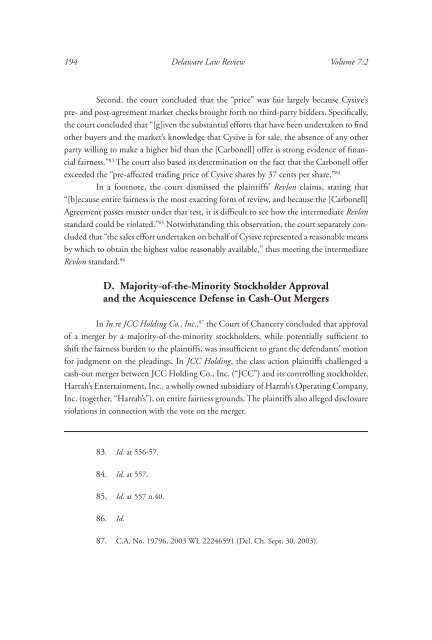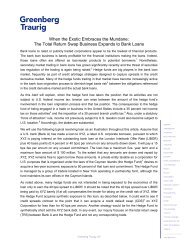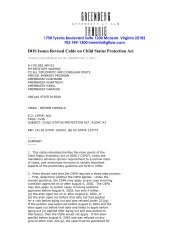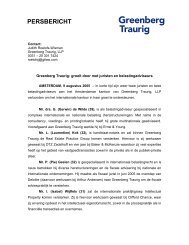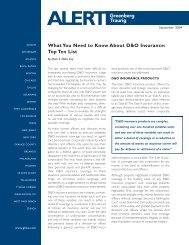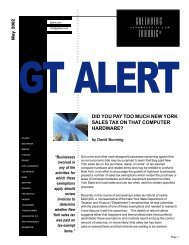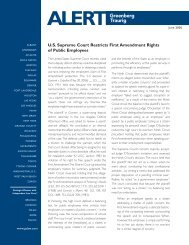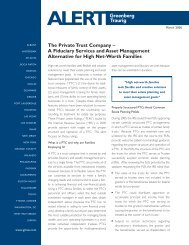recent developments in delaware corporate law - Greenberg Traurig ...
recent developments in delaware corporate law - Greenberg Traurig ...
recent developments in delaware corporate law - Greenberg Traurig ...
You also want an ePaper? Increase the reach of your titles
YUMPU automatically turns print PDFs into web optimized ePapers that Google loves.
194 De<strong>law</strong>are Law Review Volume 7:2<br />
Second, the court concluded that the “price” was fair largely because Cysive’s<br />
pre- and post-agreement market checks brought forth no third-party bidders. Specifically,<br />
the court concluded that “[g]iven the substantial efforts that have been undertaken to f<strong>in</strong>d<br />
other buyers and the market’s knowledge that Cysive is for sale, the absence of any other<br />
party will<strong>in</strong>g to make a higher bid than the [Carbonell] offer is strong evidence of f<strong>in</strong>ancial<br />
fairness.” 83 The court also based its determ<strong>in</strong>ation on the fact that the Carbonell offer<br />
exceeded the “pre-affected trad<strong>in</strong>g price of Cysive shares by 37 cents per share.” 84<br />
In a footnote, the court dismissed the pla<strong>in</strong>tiffs’ Revlon claims, stat<strong>in</strong>g that<br />
“[b]ecause entire fairness is the most exact<strong>in</strong>g form of review, and because the [Carbonell]<br />
Agreement passes muster under that test, it is difficult to see how the <strong>in</strong>termediate Revlon<br />
standard could be violated.” 85 Notwithstand<strong>in</strong>g this observation, the court separately concluded<br />
that “the sales effort undertaken on behalf of Cysive represented a reasonable means<br />
by which to obta<strong>in</strong> the highest value reasonably available,” thus meet<strong>in</strong>g the <strong>in</strong>termediate<br />
Revlon standard. 86<br />
D. Majority-of-the-M<strong>in</strong>ority Stockholder Approval<br />
and the Acquiescence Defense <strong>in</strong> Cash-Out Mergers<br />
In In re JCC Hold<strong>in</strong>g Co., Inc., 87 the Court of Chancery concluded that approval<br />
of a merger by a majority-of-the-m<strong>in</strong>ority stockholders, while potentially sufficient to<br />
shift the fairness burden to the pla<strong>in</strong>tiffs, was <strong>in</strong>sufficient to grant the defendants’ motion<br />
for judgment on the plead<strong>in</strong>gs. In JCC Hold<strong>in</strong>g, the class action pla<strong>in</strong>tiffs challenged a<br />
cash-out merger between JCC Hold<strong>in</strong>g Co., Inc. (“JCC”) and its controll<strong>in</strong>g stockholder,<br />
Harrah’s Enterta<strong>in</strong>ment, Inc., a wholly owned subsidiary of Harrah’s Operat<strong>in</strong>g Company,<br />
Inc. (together, “Harrah’s”), on entire fairness grounds. The pla<strong>in</strong>tiffs also alleged disclosure<br />
violations <strong>in</strong> connection with the vote on the merger.<br />
83. Id. at 556-57.<br />
84. Id. at 557.<br />
85. Id. at 557 n.40.<br />
86. Id.<br />
87. C.A. No. 19796, 2003 WL 22246591 (Del. Ch. Sept. 30, 2003).


